

We are most grateful to Walker Singleton and Charnock Bates for their support of our Autumn Concert


James Savage-Hanford – conductor
Lorna James – soprano
Beth Moxon – mezzo soprano
Andrew Henley – tenor
Samuel Jackson – bass
Robert Sudall – piano
Alan Horsey – organ
Rossini is remembered primarily for his immense contribution to the Italian operatic repertoire, but he also produced two important pieces of sacred music that are notable, amongst other things, for their overtly operatic style. This incorporation of the music of the opera house into the sacred repertoire may appear to have been a bold innovation, but in terms of dramatic content it was a well-established practice. Most composers who were familiar with the theatre as well as the church used elements of the operatic style in order to give their sacred compositions greater impact. A prime example is Handel, but the tradition goes back to Monteverdi, the first great opera composer, who even borrowed his own overture to The Coronation of Poppea for the opening movement of his 1610 Vespers. What is original about Rossini’s sacred music is not so much its dramatic power, impressive though that is, as its unashamed romanticism.
Like so many of the great composers, Rossini was born into a musical family. His father was the town trumpeter in Pesaro and his mother was an opera singer. Both parents worked in various theatres in the region, and from an early age Gioachino went with them. As a talented boy soprano he was soon in great demand, and by the time he had reached his teens he could play the viola and the horn and was rapidly acquiring a reputation as a first-rate harpsichord-player and pianist. He went on to study at the Bologna Academy of Music, composing his first opera whilst still a student. From then on his rise to fame was meteoric. He received his first professional commission in 1810, which led to a string of further commissions. With the enormous success of his first full-length opera,Tancredi (1812), and the even greater triumph of The Italian girl in Algiers (1813), he became celebrated throughout Italy and his international reputation was firmly launched.
He was still only 23 when he was engaged as Musical Director of the two opera houses in Naples, for each of which he was required to compose a new opera annually, the ever-popular Barber of Seville being one of the happiest results. Rossini was always greatly attracted to a life of leisure, and as he was of a somewhat indolent nature he would frequently put off until the last possible moment the completion of his latest commission. He would then work at an incredible speed; several of his operas were written in under three weeks, an astonishing feat by any standards. He travelled widely throughout Europe, and in 1824 settled in Paris as Director of the Théâtre Italien. A string of new compositions followed, culminating in his acknowledged masterpiece, William Tell, completed in 1829 when he was still only 37.
At this point Rossini’s life changed dramatically. For no apparent reason he gave up composing, and apart from two important religious works, the Stabat Mater (1842) and the Petite Messe Solennelle (1863), he wrote nothing of significance during the last forty years of his life. It may be that he had run out of energy and inspiration – William Tell had been his thirty-sixth opera in nineteen years – or perhaps simply that he was by now so immensely wealthy that he had no particular incentive to go on working. He retired to a luxurious villa specially built for him at Passy, on the outskirts of Paris, where he was able to live the life of idleness and self-indulgence that, as a renowned gourmet and bon vivant, he had always found so appealing. A visit to his villa was obligatory for every musician of importance visiting the capital, and here Rossini would hold court, entertaining everyone with his sparkling wit and good food, and revelling in the adulation of the constant stream of admirers and eminent visitors. These included Wagner, of whom he once wryly observed, ‘His music has lovely moments but awful quarters of an hour!’
In his latter years Rossini turned once again to composition, producing what he called his Péchés de Vieillesse (Sins of Old Age), a collection of light-hearted pieces for piano, some also with voices. Despite his withdrawal from the operatic world, he continued to be held in such enormous esteem that when he died 6,000 mourners, four military bands, a chorus of 400 singers and several of the finest opera soloists of the day attended his funeral.
The Petite Messe Solennelle is the most substantial of the works written during Rossini’s Indian summer of composition. It was composed in 1863 for private performance and is scored for four soloists and chorus, with harmonium and piano accompaniment. It was not heard in public until 1869, the year after his death, when it was performed in the composer’s own orchestral version at the Théâtre Italien. The work’s title is misleading, since the Petite Messe Solennelle is neither petite nor particularly solemn. It lasts well over an hour, and despite the religious text is unmistakeably operatic in style, in common with the Stabat Mater of twenty years earlier. The music ranges from hushed intensity to boisterous high spirits, and abounds in the memorable tunes and rhythmic vitality for which Rossini became justly famous.
The quiet A minor opening of the Kyrie Eleison contrasts sustained choral writing with a running bass part in the piano accompaniment. This soon gives way to a brighter mood as the music moves into the major. For the Christe Eleison, Rossini adopted a deliberately archaic style, echoing the church music of Palestrina some 300 years earlier. As the second Kyrie unfolds, the movement returns to the serious mood in which it began. The Gloria begins with a short introduction for chorus and soloists, followed by four extended solo movements that are operatic arias in all but name. The chorus returns for the final section of the Gloria, an extended fugue to the words ‘Cum sancto spiritu in gloria Dei Patris, Amen.’ This is a real tour de force of musical craftsmanship, reflecting the thorough classical training in harmony and counterpoint that Rossini received all those years ago at the Bologna Academy.
In the Credo Rossini ingeniously uses the word ‘credo’ as a unifying motif to which he repeatedly returns. This section of the mass concludes with another brilliant fugue for the chorus, at the words ‘Et vitam venturi saeculi, Amen.’ There follows an extended piano solo, leading to a lyrical Sanctus and Benedictus, and the work ends with a moving Agnus Dei for the alto soloist and chorus.
There is a sense in which Rossini’s extraordinary musical facility was one of his weaknesses as well as one of his strengths. He once remarked, ‘Show me a laundry list and I will set it to music!’ and this neatly illustrates his complete confidence in his own ability to produce music to order, whatever the words. To some extent, this is what he has done in the Petite Messe. Of course, there are many sections which beautifully reflect the words, such as the Christe Eleison and the Agnus Dei, but in other places one feels that Rossini has paid little regard to the essential meaning and form of the text. The two extended choral fugues are good examples of this; they are disproportionately grand in relation to the rest of the Gloria and Credo. Yet at no point in the work does the music become remotely dull or routine. Such was Rossini’s genius that even when the spirit of the music seems to depart from the spirit of the text one can’t help but be captivated by the beautiful melodies and sheer joie-de-vivre of the piece. As he himself said, ‘Delight must be the basis and aim of this art’, and that is what he has achieved – a work not of profound religious insight, but one that is a delightful, life-enhancing musical experience.
With grateful thanks to John Bawden for these programme notes.
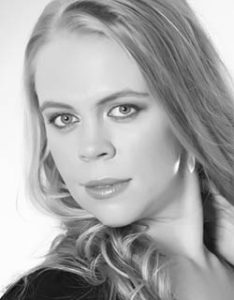
Lorna James graduated from the Royal Northern College of Music in 2010, and subsequently studied with Stuart MacIntyre and Jane Irwin. During 2015/16, as part of a successful and varied freelance career working with companies such as Opera North, Heritage Opera and Diva Opera, she collaborated with director Emma Black and conductor/pianist Chris Pelly on a new production of Poulenc’s La voix humaine, which was performed a number of times across the UK.
In 2016, Lorna joined the full time chorus of Opera North, and in May 2021, she embarked on a new adventure, retraining as a therapeutic counsellor. During her time at Opera North, she covered/performed a range of roles including Governess (The Turn of the Screw), First Lady (The Magic Flute), Donna Elvira (Don Giovanni), Fiordiligi (Cosi fan tutte), Marenka (The Bartered Bride), Vitellia (La clemenza di Tito), Helena (A Midsummer Night’s Dream) and Carrie (Carousel).
Lorna’s move away from full time opera means she is able to fully embrace singing a range of styles again, including regular performances of Will Todd’s Mass in Blue. She also sings with the Northern Collective Big Band, based in Sheffield.
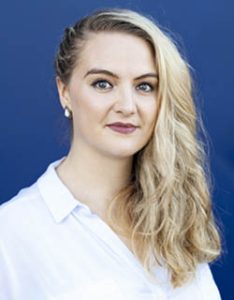
Born and raised in Leeds, Beth studied at the Royal College of Music, National Opera Studio, and the Britten Pears Programme with Sir Antonio Pappano. Since then she has sung roles in the UK and abroad including Penelope Il ritorno d’Ulisse in Patria at Opéra de Vichy and Opéra de Lyon, L’enfant L’enfant et les sortilèges at Opéra de Lyon and the Royal Opera House Muscat and the premiere of Hannah Kendall’s Knife of Dawn at the Royal Opera House Covent Garden.
Beth has worked for English National Opera, Glyndebourne, Opera North and Opera Holland Park and is involved in the development of several new operas for the Royal Opera House, Glyndebourne and Faber Music.
Oratorio performances have included Vaughan William’s Serenade to Music in the Throne Room of Buckingham Palace, Bach’s St Matthew Passion in Southwark and Coventry Cathedrals, Handel’s Messiah in Lincoln Cathedral, Elgar’s The Music Makers in Guildford and Sheffield Cathedral, Verdi’s Requiem in Gloucester Cathedral and Mozart’s Requiem at King’s College Cambridge and Colston Hall.
Upcoming engagements include joining the Samling Institute for Young Artists, the title role in Mascagni’s Zanetto, Mezzo soloist in Bach’s Christmas Oratorio, Mrs Plumpster/Fred/Ferdinand in a touring production of Heppelwhite & Yealland’s Borka, and Olga in Lehar’s The Merry Widow at the NCPA in Mumbai.
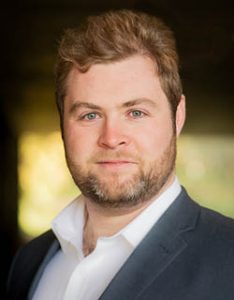
Hailing from Monmouth, Andrew studied at the Royal Welsh College of Music and Drama and is a graduate of the National Opera Studio, where he was supported by the WNO Sir John Moores Award. He was with winner of the 2019 Dunraven Young Welsh Singer of the Year and is the recipient of the 2023 John Scott Award from Scottish Opera.
Operatic engagements have included The Tenor Trauernacht, Tybalt Romeo and Juliet and Voleur de Lune Der Mond with Opéra de Lyon, Heinrich der Schreiber Tannhäuser with the Stadttheater Klagenfurt, Father Grenville Dead Man Walking and Candide (cover) Candide with Welsh National Opera, Officer and Armand (cover) Thérèse, Tenor Soloist on the Opera Highlights Tour and Nemorino (cover) L’elisir d’amore with Scottish Opera, Barigoule Cendrillon with Buxton International Festival, Don Ottavio Don Giovanni with Clonter Opera, Novice Billy Budd with the St Endellion Festival, Lechmere Owen Wingrave with British Youth Opera, Major (cover) Patience with English Touring Opera, Kekikako Bataclan with West Green House, Christoph Kommilitonen! with Welsh National Youth Opera and chorus with Glyndebourne and Wexford Festival Opera. Roles at RWCMD included Fenton Falstaff, Albert Albert Herring and Schoolmaster The Cunning Little Vixen. Upcoming engagements include Ottavio (cover) Don Giovanni in Glyndebourne’s Autumn season, Ostrogoto La Fiera di Venezia with Bampton Classical Opera and Adam A+E at the Grimeborn Festival.
Concert engagements have included Mendelssohn Elijah at Cadogan Hall with the City of London Sinfonia, an opera highlights concert with the WNO Orchestra conducted by Carlo Rizzi at BBC Hoddinott Hall, Mozart Mass in C Minor at Wells Cathedral, Verdi Requiem at St Paul’s Covent Garden, Vaughan Williams Serenade to Music, broadcast live on BBC Radio 3, and Purcell The Fairy Queen, conducted by Nicholas McGegan, both with the CBSO at Birmingham Symphony Hall. Before the pandemic he was due to perform Britten Les Illuminations with the Moscow Conservatory Symphony Orchestra in the Great Hall of the Moscow Tchaikovsky Conservatory.
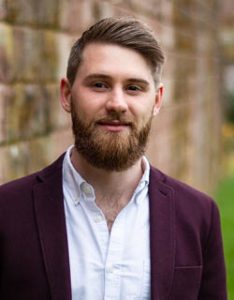
Cheshire based baritone Samuel Jackson grew up in Holmes Chapel studying singing with Patrick McGuigan and piano with Kelvin Leslie. In 2012 he began his studies at Manchester’s Royal Northern College of music, graduating with a BMus (hons) first class in 2016, and a masters in 2018 under Nicholas Powell.
Samuel’s performing experience includes the roles of Bobinet (La Vie Parisienne) and George Jones (Street Scene) for RNCM Opera, and Marcello in Flat Pack music’s production of La Boheme. Chorus work includes the 2017 tour with the National G&S Opera Company, Buxton International Festival’s young artist programme in 2018, and productions of Aida, Carmen and Parsifal with Opera North between 2019 and 2022. Samuel performed in the chorus of The Flying Dutchman with Grange Park Opera in summer 2022 and returned in 2023 for Tristan und Isolde. Samuel also teaches singing at several Cheshire schools, and at the Junior RNCM.
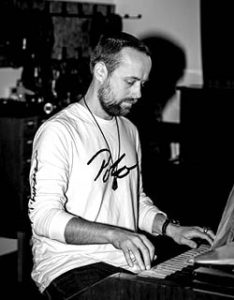
Robert Sudall is a jazz pianist, organist and composer, with a musical outlook of unique scope and ambition. Studying organ at the Royal Northern College of Music in Manchester, Robert has since developed into a musician with a huge array of musical interests and influences. Drawing on genres as diverse as classical, jazz and folk, to world, electronic and rock, he is continually seeking new sources of inspiration from which to grow and deepen his craft.
As a performer, Robert has given concerts across the UK and Europe, both as a soloist and as part of his contemporary piano trio, ‘Motion Complex’. Prior to the pandemic, during 2019, Robert played a series of piano recitals around the UK, in which he performed entirely improvised sets. These events offered a musical freedom and challenge that greatly appealed to Robert’s musical imaginings.
Having recorded several albums over the last decade, all featuring his own compositions, Robert’s second album Silently Evolving was played extensively on BBC Radio 2. This was recorded on the beautiful Wurlitzer theatre organ at Victoria Hall, in the World Heritage Site of Saltaire, UK.
Robert is in extensive demand as both an accompanist and teacher. He has accompanied choral societies across the Yorkshire region and is the regular accompanist for Ilkley Choral Society and Cantores Olicanae. Since 2017 he has been one of the ballet pianists for the academy of Northern Ballet.
His latest, upcoming project, Monocle Dog, will showcase an entirely new band of musicians. With Robert on Hammond C3 organ, this recording will bring jazz, funk and blues styles to the fore, and will see Robert collaborating with long-time musical partner Grant Russell, as well as new collaborators Darren Dutson-Bromley (guitar) and Mark Lewalski (drums).